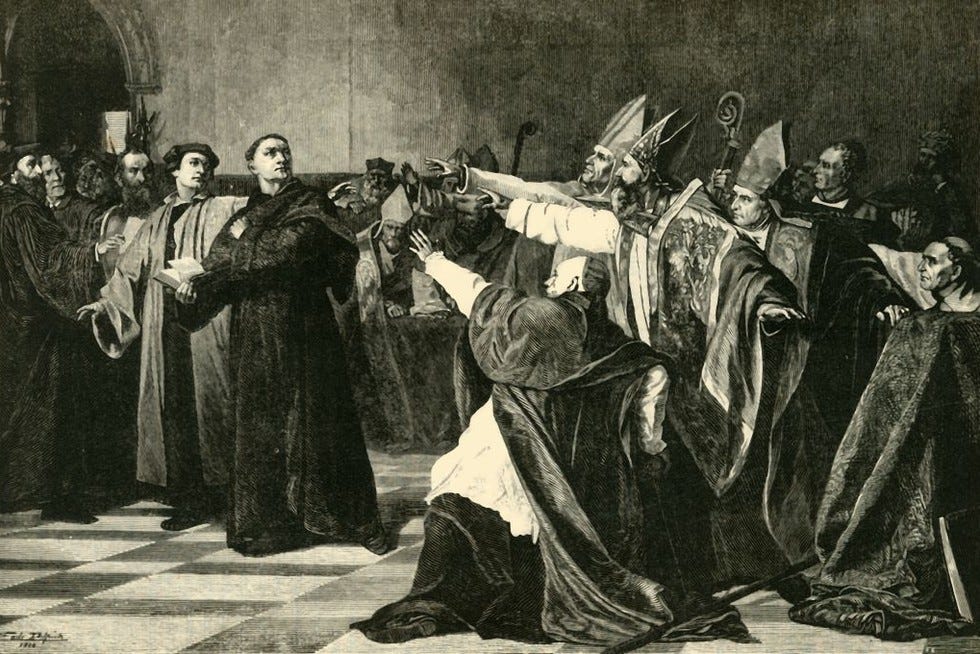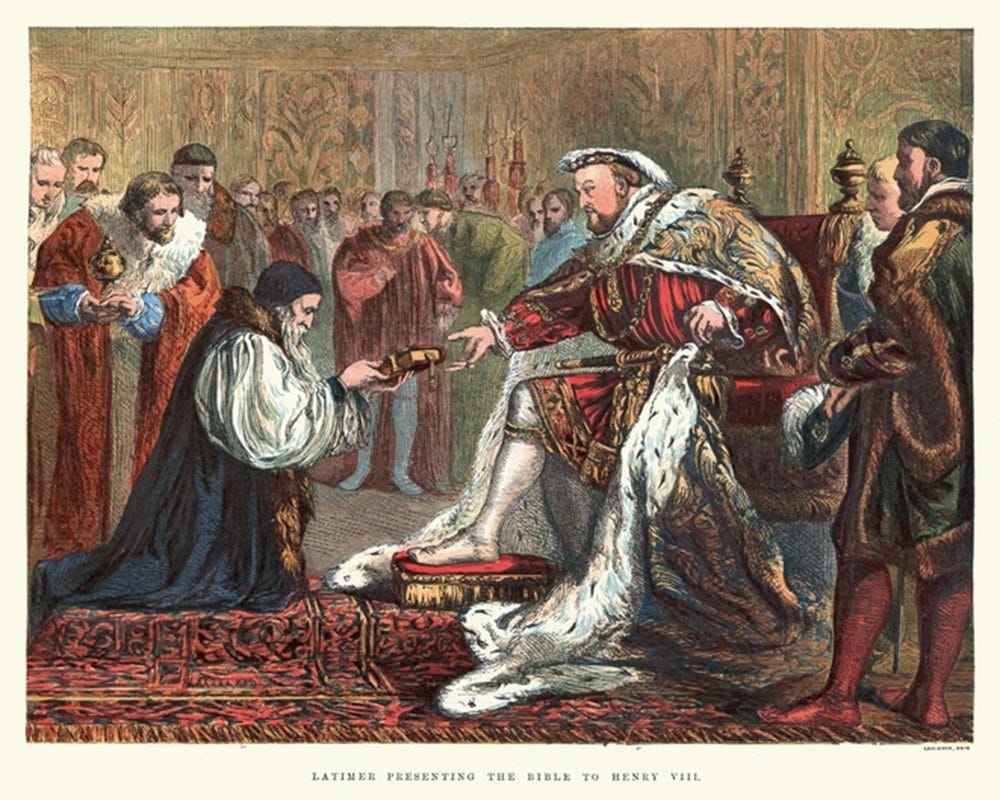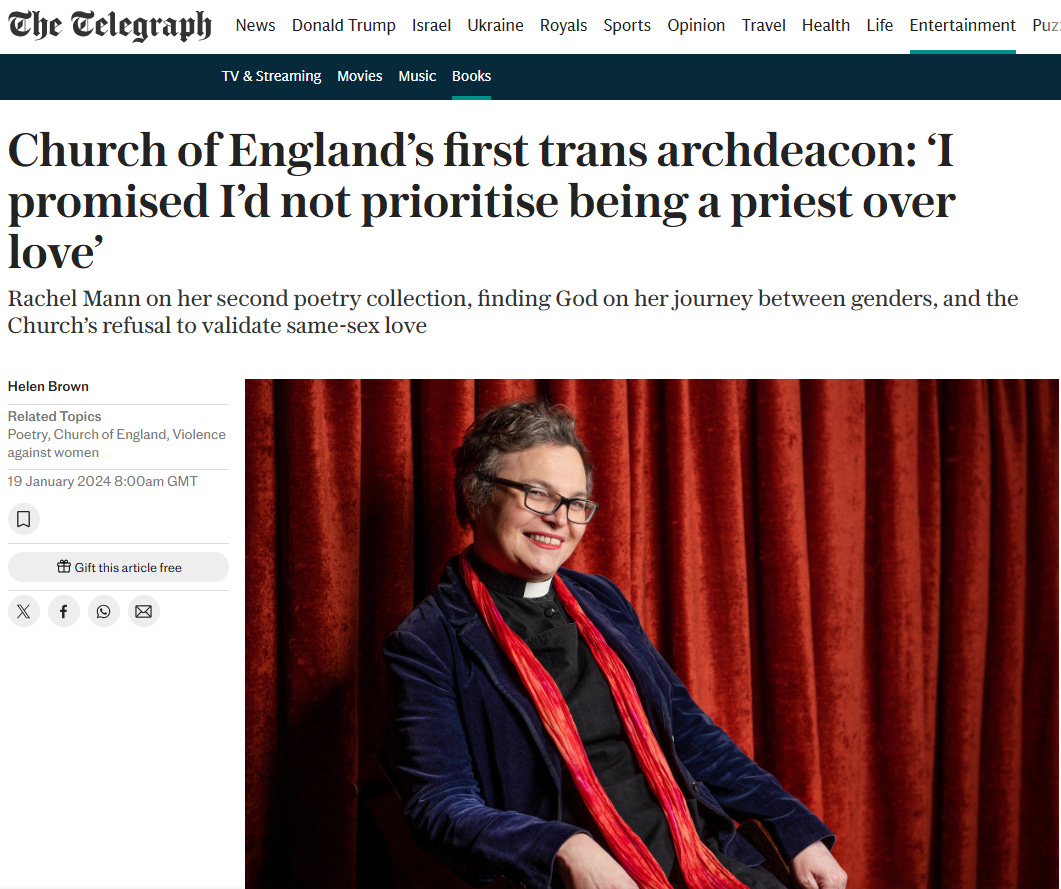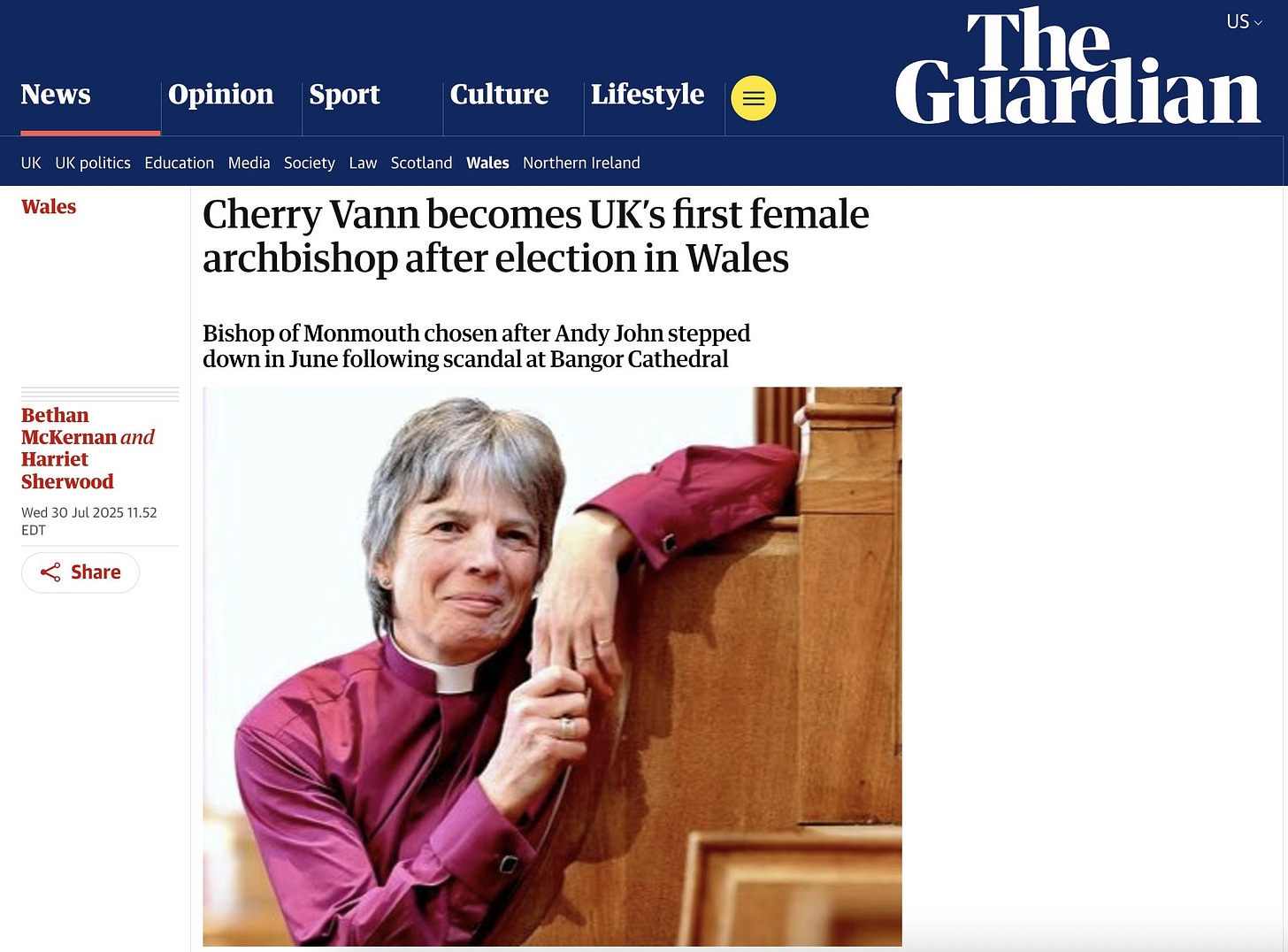Anglican Superiority Makes No Sense
Anglicanism is the English expression of the catholic faith
Why Anglicanism?
By accident of birth, I happen to have been born half-English, in England. The vast majority of Christians in England are Anglican. Anglo, after all, means English - from the Angles.
For over 600 years, the Church in England was Catholic and in full communion with Rome. In 1534, King Henry VIII broke communion with Rome when the pope refused his annulment for political reasons*. For another 300 years, the Church of England was the only Church in England. Only in 1850 was the Roman Catholic hierarchy restored in England by Pope Pius IX. And even then, Roman Catholics were still prohibited from public processions until 1926. And so, for people born in England for nearly a millennium, the Church of England has been the default expression of the catholic faith. Anglicanism was not something new, but the continuation of Christianity in England.
Reformed Christians could argue that England’s separation from the rest of the Church was a good thing; Catholics would argue that it was a bad thing. Regardless, it is the way it has been until the last hundred years or so.
Henry VIII did not ‘invent’ Anglicanism. Nor did he found a new Church. There is only one Holy Catholic and Apostolic Church, and all Anglicans affirm that fundamental tenet of the faith, which is professed as part of the liturgy.
* The Pope would not grant Henry an anulment from his wife Catherine of Aragon, not primarily for theological reasons, but because her nephew was the Holy Roman Emperor Charles V. Charles V ruled Europe, and had a large influence over the pope at that time. Remember, Charles V had sacked Rome only a few years prior, and Pope Clement VII was all but under the control of the Emperor. There were some theological concerns about whether her previous marriage to Henry’s brother had been consummated or not, and therefore whether Henry’s marriage was ever valid and/or licit to begin with.
Do not forget, Henry VIII was an ardent Catholic. He was awarded the title ‘Fidei Defensor’ by Pope Leo X for his theological book, Assertio Septem Sacramentorum (Defence of the Seven Sacraments), in which Henry VIII defended the Sacrament of Holy Matrimony and Papal Supremacy against the Protestant errors coming from the likes of Martin Luther.
Upon breaking from Rome, the King acted as Supreme Governor of the Church of England and published articles of faith. I have written before about the initial 6 Articles and 10 Ten Articles of faith, which were catholic in nature. The 39 Articles were published a couple of decades later, once Protestants had more firmly embedded themselves in the Establishment. The 39 Articles should therefore be understood in the context that it was a compromise. Anglo-Catholics would interpret them through St John Henry Newman’s Tract 90. Either way, the Articles make for a great historic document, but they are not binding and certainly not doctrine. In 1972, the then Archbishop of the Church of England, ++Geoffrey Fisher, himself an evangelical, reaffirmed, “We have no doctrine of our own. We only possess the Catholic doctrine of the Catholic Church enshrined in the Catholic Creeds, and these creeds we hold without addition or diminution.”
Dr James White is right to point out that people often use Anglicanism as a brief stopover on the way to Rome or the East. Reformed contemporaries of mine see this as a bug. I believe this to be a feature.
I do not understand Anglican superiority. Anglicanism is not the best expression of the catholic faith; it is merely the English tradition of the catholic faith. It is beautiful and ancient, it is unique, but it is not superior to Roman Catholicism or Eastern Orthodoxy. That said, the English managed to hold onto many treasures of the Church that have been forgotten by much of the rest of the Western Church. You will still find rood screens in some old English churches, and Anglican Catholic churches will still have altar rails for congregants to receive Communion kneeling, on the tongue; you will not find ‘Extraordinary Eucharist Ministers’, guitars, projector screens or parishioners praying the Pater Noster with hands out in the orans position. For the most part, anyway. You will find all of those things and worse in the more evangelical arm of the Anglican Church, which is more protestant in nature. But the Anglo-Catholics, thanks to Laudianism, the Caroline Divines, and the Oxford Movement, managed to maintain much of the ancient goodness of the Anglo expression of catholicism, including influences from the Sarum Use*. Evensong is one of the greatest liturgical expressions of Evening Prayer (Vespers); it is a truly marvellous act of thanksgiving, likewise with Mattins. The Daily Office, in accordance with the Book of Common Prayer, with Anglican Chant (or even Plainchant) is a thing to behold. Divine Worship: Daily Office really embraces this tradition and leans into that extraordinary Early Modern English language that adds a touch of extra reverence to the worship.
* The Sarum Use was the local adaptation of the Roman Rite. Coming out of Salisbury, and different to other English adaptations such as York Use, the Sarum Use was the predominant liturgy of England before the Reformation. Sarum had an influence on the liturgies of the Book of Common Prayer, and more so on the English Missal. Sarum Use is still technically a legal form of the Mass in the Roman Catholic Church, Anglicans still celebrate much of it through the Anglican Missal, and the Western Rite Orthodox publish a reconstructed version of it in their Saint Colman Prayer Book. A version can be read in the archives online. Bear in mind, the Roman Missal (Missale Romanum) was not promulgated until 1570, after the Council of Trent. The first Book of Common Prayer was released in 1549, with the next major edition in 1552, and the final official version in 1662. In essence, the Sarum Use was a pre-TLM Roman Rite, a standardisation of the Mass for the Anglos. The Anglican Missal draws on the Sarum Use, English Missal, Book of Common Prayer and Roman Missal. We use the Anglican Missal for Sunday Mass at St Paul’s Grand Rapids. It is very common amongst Anglo-Catholics in America - less so in Britain, where they tend to use the Novus Ordo (the more contemporary post-1962 Roman Missal).
All that to say, Anglo-Catholicism is not a different religion. It is certainly not new. It is merely an adherence to the ancient and beautiful English expression of the catholic faith. And so, if people find Anglicanism on their way to Rome, that should not be something to sneer at. That should be something to celebrate. In a world of ugliness and darkness, if people find a glimmer of hope and beauty in our old tradition, and that leads them to the fullness of the faith, then all praise and glory be to God.
As Western Christians, we have always looked to Rome for spiritual direction, as that is the Chair of Saint Peter, the Patriarch of the West. Anglicans are not anti-Catholic or anti-Pope. Anglicans recognise the primacy of the Bishop of Rome and respect the papacy, even if they disagree with modern interpretations of Papal Infallibility (i.e. Vatican I).
Anglicanism in the West is a mess. The Church of England has a trans Archdeacon, the Church in Wales has a female ‘married’ lesbian Archbishop, the Anglican Church in North America has women priests and deacons, and the Episcopal Church has openly homosexual bishops. Having been separated from the Church hierarchy has brought about unique problems that cannot be found in the majority of the Church. The Magesterium provides great security in its authority. No matter how socially liberal some boomer post-62 Novus Ordo Roman Catholics may be, they cannot change Church teaching in the same way their contemporaries in the Anglican Communion do.
It should be our hope that the Church of England re-enters full Communion with Rome, ditching its liberalism in place of orthodox Catholicism. Making England Catholic again may actually be the only way to save our once great nation from the pincer movement of the joint attack between Islam and Marxism that is currently destroying it.
All Christians should pray for greater unity. Christ has one Church. We can disagree on what it means to be in the Church or outside of the Church, but I find it strange to besmirch fellow kingdom travellers who find a home in Rome. Likewise, for Eastern Christians who find a home in Constantinople. Crossing the Bosphorus or the Tiber is a fine thing for a Christian who started their journey as a Protestant, for we are a faith of Word and Sacrament, and if they pass through Anglicanism on the way, that says great things about our tradition.
Let us not hold people back or be overly protective of our little corner of the Church. Let us offer people a step up. And pray and work towards greater Christian unity.
That they all may be one; as thou, Father, art in me, and I in thee, that they also may be one in us: that the world may believe that thou hast sent me.
And the glory which thou gavest me I have given them; that they may be one, even as we are one:
I in them, and thou in me, that they may be made perfect in one; and that the world may know that thou hast sent me, and hast loved them, as thou hast loved me. (John 17:21-23)











The Church (Catholic) still existed after Henry split. In priest holes, the hearts of holy women, in dungeons and on the gallows.
St Edmund Campion pray for us.
Come home man +
The West and the Church will live or die based on whether we choose Jesus vs the many faced enemy: secularist humanism/neo-marxism/neo-paganism/Islam.